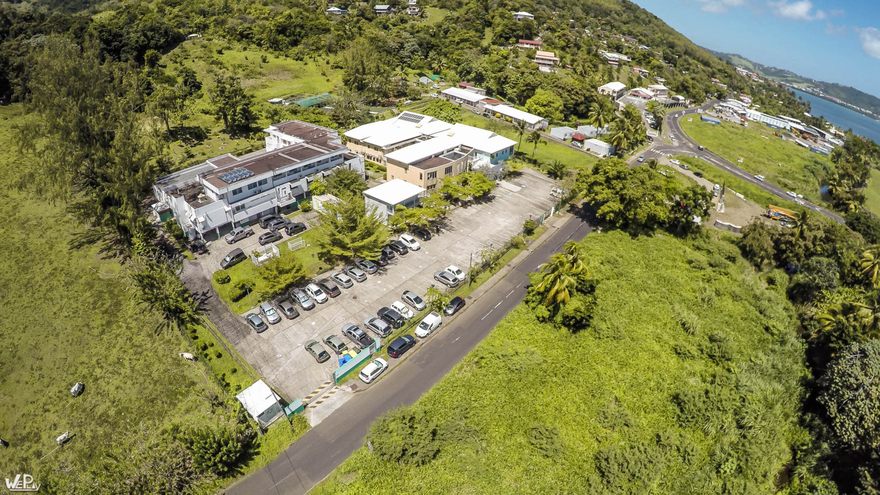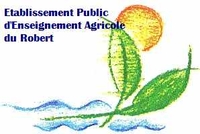Formation générale technologique et professionnelle
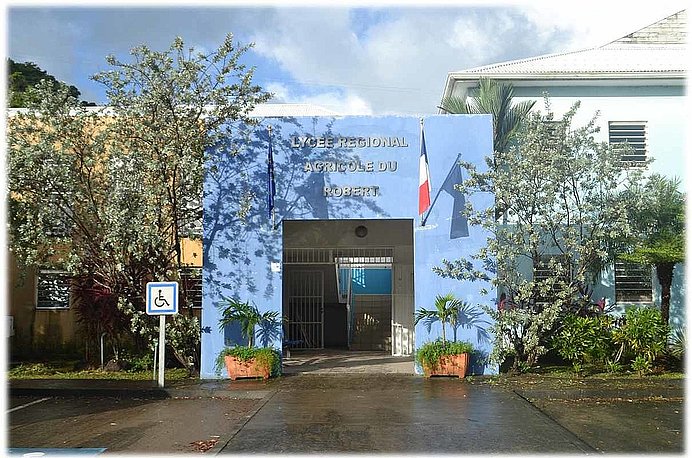
Nos coordonnées GPS : 14.65490 , -60.93478
L'Établissement Public d'Enseignement Agricole du Robert met en œuvre des formations dans de nombreux domaines en lien avec les territoires : Services aux personnes en milieu rural, aménagements paysagers, vente de produits alimentaires, transformation agroalimentaire, responsable d’exploitation, production horticole…
Un Lycée qui accueille 250 élèves de la 3ème de collège au BTS.
Le centre de formation continue situé sur le Robert et sur la commune du Lorrain accueille des stagiaires pour des formations courtes ou longues certifiantes ou diplômantes qui sont financées par différents organismes.
A cela s’ajoute une exploitation agricole dont les activités sont réparties sur les sites du Robert qui dispose d’une station d’aquaponie avec productions maraichères, et sur le Lorrain où se développe une production de plants sous serre. Sur le site du Robert une vente directe des produits agricoles est organisée à partir du mois de janvier.
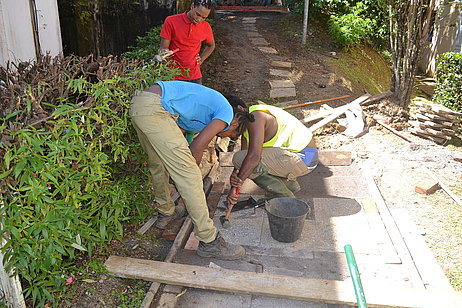
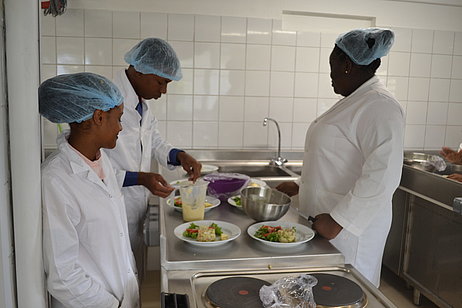

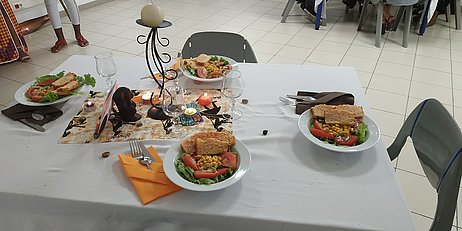
La coopération internationale
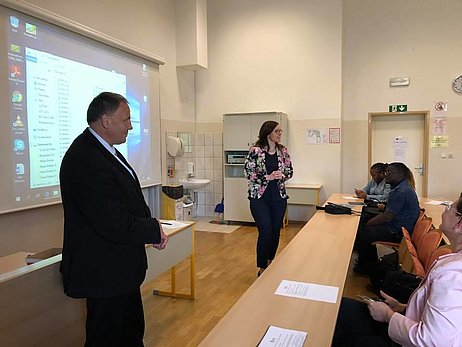
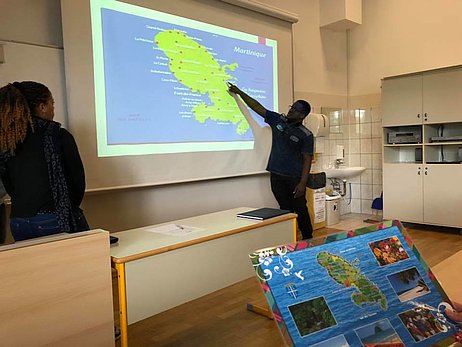
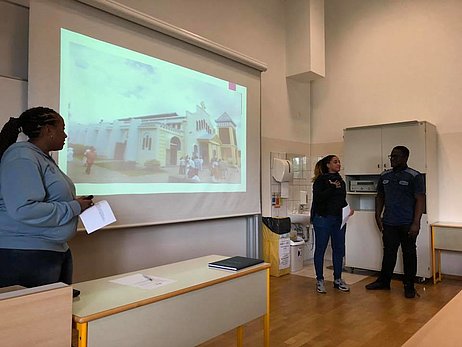
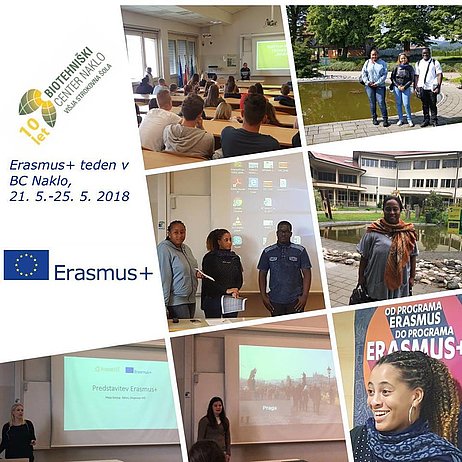
Le handicap ne doit pas être un frein à la mobilité des étudiants et des personnels en situation de handicap : Bourses spécifiques pour les personnes en situation de handicap en complément de la bourse de mobilité pour prendre en charge les frais supplémentaires engendrés par leur séjour en Europe.
Charte-Charter

La coopération internationale participe et valorise les quatre missions de l’enseignement agricole. Elle fait d’ailleurs partie des axes prioritaires du projet d’établissement de l’EPLEFPA.
Elle a pour but de stimuler l’implication croissante de la communauté éducative dans les différents programmes.
Cette dynamique s’inscrit dans le cadre de la modernisation de l’enseignement supérieur afin d’améliorer le niveau de qualification des apprenants et des personnels. Cette stratégie devrait contribuer à la valorisation des parcours de formation et à l’acquisition des savoir-être directement utilisables dans les modules d’initiative locale, dans le cadre des stages obligatoires évalués à l’examen et à long terme lors de recherches d’emploi. Pour le personnel, l’expérience à l’international renforce leur niveau de compétences et développe des perspectives d’évolution de carrières.
La communauté éducative participe d’ores et déjà aux rendez-vous européens incontournables comme les journées régionales de coopération internationale (JRCI), et les différentes conférences d’envergure internationale rassemblant tous les partenaires autour d’une thématique.
OBJECTIFS :
- Mettre pleinement en œuvre la mission d’animation du territoire dévolue aux établissements agricoles.
- Elaborer et mettre en place des projets de partenariats stratégiques en associant tous les interlocuteurs publics et privés.
- Diversifier l’approche des activités pédagogiques au profit des personnels dans l’espace éducatif européen.
- Valoriser les domaines d’expertise du territoire à l’international.
PUBLIC :
- Apprenants en formation initiale (BAC PRO – BTSA)
- Apprenants en formation continue (BP – BAC PRO – BTSA)
- Personnel éducatif (enseignants – administratifs – techniciens – professionnels)
Charte Erasmus : Cliquez ici pour visualiser la charte.
Déclaration en matière de Stratégie Erasmus : Cliquez ici pour visualiser


a) Avant la mobilité
Nos étudiants bénéficient dans leur programme de formation de cours d'anglais (deux heures hebdomadaires), du module d'enseignement pour l'aide à l'élaboration du projet personnel de l'étudiant et de l'accompagnement individualisé. Un lexique bilingue professionnel et technique est également mis à leur disposition.
Les évaluations du niveau de langue (niveau B1 - compréhension orale / niveau B2 - compréhension écrite) permettent d'identifier la nécessité ou non d'un soutien linguistique. Le niveau de langue exigé sera déterminé en fonction du type de mobilité (stage ou étude).
En cas de besoin, l'étudiant est conseillé par l'enseignant de langue à l'occasion d'entretiens particuliers et orienté vers des plateformes de cours en ligne (oneline linguistic support). Pour les personnels, la préparation linguistique se fait au cas par cas en fonction des tâches envisagées. L'enseignant de langue est mobilisé et des outils d'évaluation et d'autoformation sont proposés (DIALANG ou LINGUANET). Si un complément est nécessaire, l'EES dispose de dispositifs de formation individuelle ou collective mises en place par le MAAF et peut proposer un plan de formation via le CNPR.
b) Pendant la mobilité
Un dispositif personnalisable est prévu a fin de faciliter leur intégration. Des cours de Français Langue Etrangère sont également dispensés par un enseignant de langues (français /anglais). L'accessibilité aux cours du soir à l'Université des Antilles peut être envisagée. Ils bénéficient d'un système de parrainage avec d'autres étudiants locaux, ce qui viendrait en renfort et en complément des cours.
Une cellule constituée d’enseignants et d’administratifs accompagnent les candidats dans leurs démarches de réalisation d'un projet de mobilité et organisent les mobilités entrantes et sortantes pour les étudiants et le personnel.
Bureau des relations européennes et de la coopération internationale : 1 ter avenue de Lowendal, 75700 Paris 07 SP | Etablissement : ELPEFPA du Robert Quartier Four à Chaux 97231 LE ROBERT Tel : 0596 65 10 43 Email : Site internet : www.eplefpa-lerobert.educagri.fr Directeur de l'EPLEFPA : Vincent RIPOCHE |
Référents CE&I : Mickaëlle REIBEC Enseignante |
Marion MAURANNE Secrétaire administrative |
Coordonnateurs de filière : Nathalie WEBER Enseignante |
Patricia MIRAM-MARTHE-ROSE Enseignante |
Enseignants de FLE : Danielle ALMON Enseignante Correspondant CFPPA : Gabrielle ROSINE Directrice du CFPPA |
Nicomède PERONET Enseignante |
Le mot du Directeur
La mission de coopération internationale est une obligation pour tous les établissements de l’enseignement agricole.
L’établissement du Robert, dépositaire d’une charte Erasmus plus, engage des mobilités pour les étudiants scolarisés en Brevet de techniciens Supérieurs Agricoles Sciences et technologies des Aliments. L’étudiant effectue son stage long de 60 jours minimum dans une entreprise ou un établissement agro-alimentaire étranger.
Les partenariats concernent la Slovénie, le Portugal et l’ile de madère avec lesquels des mobilités ont été réalisées depuis 2017. Des contacts sont en cours pour établir un partenariat avec l’Université de Szeged en Hongrie et l’Ecole de Piramida à Maribor en Slovénie.
L’objectif est de faire découvrir d’autres pratiques en milieu professionnel, tout en étant en situation d’immersion totale en pays étranger. C’est une magnifique opportunité pour nos jeunes dont une bonne partie n’a pas eu l’occasion de voyager vers les destinations proposées.
Bien entendu, l’étudiant est guidé dans ses démarches par l’équipe pédagogique, mais c’est lui qui doit être au cœur du projet de mobilité. Une préparation en amont du départ est prévue pour faciliter au mieux son intégration. L’Europe finance environ 2800€ pour une mobilité individuelle. D’autres aides peuvent être accordées notamment par le Ministère de l’Agriculture et la Collectivité Territoriale de Martinique.
Cette expérience unique dure 8 semaines minimum. La mobilité individuelle est ponctuée de rencontres, d’échanges, de partage, de développement de nouvelles compétences, renforcée par la pratique d’une langue étrangère. C’est aussi une expérience de vie qui permet au jeune en formation de développer son autonomie et son sens des responsabilités.
L’établissement souhaite également permettre aux élèves scolarisés en formation professionnelle (baccalauréat professionnel au LPA) et aux stagiaires adultes de la formation continue du CFPPA de vivre une expérience à l’étranger. C’est pourquoi nous nous portons candidat à l’accréditation d’un consortium Antilles Guyane regroupant les EPLEFPA du Robert et de Croix Rivail en Martinique, Convenance en Guadeloupe et Macouria en Guyane. Réponse en fin d’année avant de faire la demande de financement pour se lancer dans une nouvelle aventure Erasmus +.
Nul doute que la mobilité à l’étranger est source d’enrichissement personnel et professionnel. C’est aussi un argument et un atout supplémentaire pour s’insérer sur le marché du travail. Cette démarche est toujours appréciée des entreprises qui recrutent.
Le Directeur de l’EPLEFPA du Robert
Vincent RIPOCHE
International cooperation: an opening on the world
International cooperation contributes to the development of the four missions dedicated to the agricultural education. All the more, it is one of the main focus of the school project of the EPLEFPA
Its main function is to stimulate the increasing investment of the educational community through the different programmes.
This dynamics is part of the modernization of higher education in order to improve the level of the students and also of the staff. This strategy is meant to develop the training courses and to help students get the professional skills which are necessary to the local initiative subjects, in compulsory internships subject to an exam. Such an experience will also be useful when looking for a job. As for the staff, the international experience improves their skills and develops future career prospects.
The educational community already takes part in unavoidable European meetings such as the JRCI (regional meetings of international cooperation) as well as the different international conferences gathering all the partners around the same subject.
OBJECTIVES:
- Make sure that the agricultural high schools enforce their mission of animation of the territory
- Work out and set up projects of strategic partnerships by involving all the public and private negotiating partners
- Diversify the teaching activities in favour of the staff in the European educational space.
- Appreciate our specific fields at the international level.
TARGET AUDIENCE
- Learners in initial training (BTEC National diploma, BTEC Higher national diploma)
- Learners in training (Professional diploma, BTEC National diploma, BTEC Higher national diploma)
- Educational staff (teachers, administrative staff, technicians, professionals)
For further information: https://chlorofil.fr/actions/coopint
Erasmus chart: click here to visualize the chart
Example of project: Outgoing mobility in Portugal
CONTACTS:
A team of teachers and administrative staff help the candidates on their project of mobility and organizes the incoming and outgoing mobilities for the students and the staff.
· Office of the European relations and international cooperation (BRECI):
1 ter avenue de lowendal, 75700 Paris 07 SP
· School :
EPLEFPA of Robert, quartier Four à Chaux 97231 le Robert. Tel : 0596 65 10 43
Email :
Web site: www.eplefpa-lerobert.educagri.fr
International correspondents :
Mickaëlle REIBEC
Enseignante
Technical teachers
Patricia MIRAM-MARTHE-ROSE
Teacher
Nathalie WEBER
Teacher
Danielle ALMON
Teacher
Nicomède PERONET
English teacher
Administrative staff
Marion MAURANNE
Administrative secretary
Strategy statement concerning Erasmus
The EPLEFPA of Robert in Martinique is composed of an agricultural vocational high school, a training centre for adults and a farm which is the main framework of the educational methods. The institution proposes technical and professional courses in different fields such as food industry, agronomy and landscaping. There are about 300 learners. 32 of them are studying to get the advanced vocational training certificate (BTSA). It is not only one of the 5 missions of the agricultural education, the CE&I (European and international cooperation) is part of the first issues of the school project. The aim of our strategy is based on the policy of the MAAF (ministry of agriculture, food and forestry), relayed by the BRECI (office of European relationships and international cooperation). All of this is coordinated at a regional level by the geographic networks. Our expertise in the subjects we teach enabled us to build reliable relationships with a network of professionals, former students and local partners (town halls, community of agglomeration, the CTM which is the local authority of Martinique), in order to get more opportunities of incoming mobilities. Within the framework of the national policy willing to gather the vocational and the higher education, we have started to work with our University on the possibility to set up post-bac training. This scheme will include the added value induced by the different training sessions in terms of sharing teaching practices and methods. These actions are focused on the mobility of the whole educational community which shows that our objectives are as follows:
- The opening up of the young people who don’t have many opportunities
- The improvement of their employability through social and professional integration.
- The development of education and citizenship.
a) The EPLEFPA would like to encourage the mobility of its students as well as the teachers. In fact, when the teachers position themselves first, it is easier to establish connections abroad and then the students feel more motivated to move. As for the students and the staff, we are planning outgoing mobilities based on the work experience with the school of Naklo and its network of reliable partners in Slovenia. We had the possibility to establish the connection thanks to the arrival in September 2015 of a director who had already experienced CE&I for many years. We also had the opportunity to meet the European representative of the network Hungary, Slovenia and Croatia. She confirmed us that these exchanges were interesting as they would contribute to the development of professional and technical practices. This special partnership fulfils our range of activities particularly for our BTSA students. Indeed, the activities of the companies of the network meet the educational requirements and also the responsibilities of the trainee and of the tutor during the training periods. It also meets the requirements concerning the reception and work conditions of a European student. As we go and meet them, we will be able to set up a personal information sheet for each company. These sheets will constitute a joint directory. The mobility of the staff will be set up according to their personal project in so far as their trainings are similar or complementary to ours. Strategic partnerships will be held with other countries and outside the European Union according to the issue which will be addressed (water management, landscaping, fish-farming) with the help of well-known networks: geographic networks of the MAAF, local networks of decentralized cooperation.
b) The mobilities for the training periods and for the staff will take place in Slovenia, Hungary and Croatia. The other actions will take place in other regions of the world. South America (Brazil and Argentina) and the Caribbean (Haiti, the Dominican Republic) are favourite as they represent a pool of biodiversity in a nearby climatic region.
c) The frame of reference plans a period of work experience in a company at the end of the first year of BTSA. If the student chooses to go abroad, he will develop more and more skills and know-how. Such an experience will also help the student become more open-minded and autonomous. Such an opportunity is the key to a better social and occupational integration. The teachers also are concerned in the process of exchanges as a way to innovate their teaching methods. As for the administrative staff, they would benefit from the discovering of new management and organization systems in order to improve their practices. The farm is also linked to the different activities of the program. As it is related to the world of work, it must be connected to foreign technological processes to strengthen its situation in the vanguard of progress. It is an opportunity for all the actors to feel integrated into the European community.
The strategy of the school for the organization of projects of European and international cooperation in the teaching and training is in its beginnings. It is based on the fact that the teachers have already had the opportunity to organize field trips, mainly through the Caribbean islands. We have also benefited from the experience of the EFPLEFPA of Croix-Rivail in Martinique concerning the EFTLV (French and foreign languages teaching) programs such as Comenius or Leonardo. From 2017 to 2020, to begin the objectives are focused on work experience mobilities. We plan to create incoming and outgoing mobilities. In order to promote the work experiences abroad, a meeting with the international partners will be held during the conference of Vivus in Naklo, Slovenia. It will give us the opportunity to develop our network of companies. We intend to set up training periods inside our network of companies in order to encourage visitors to come and settle here. So, the school can federate and associate the different links between its centres and training channels. In order to help the mobilities of students, it is necessary that the teachers will have to take the first step. The mobility of the administrative and technical staff is also stimulated by the fact that they invest themselves in CE&I projects. The team working on the farm is automatically associated to the project as it is part of its missions of training, testing and helping professionals. Before the departure, each participant (student or staff, incoming or outgoing mobilities) will have to sign a contract with the different partners (sending high schools, host high schools). The terms of this contract will set the main conditions (safety, financial aspects, teaching programs, professional training). The participants will get a logistical support (transport, accommodation) as well as a linguistic one according to their needs. During the outgoing or incoming mobilities, the coordinator of the course and the tutor will make sure that everything is getting on well for the trainee. When they come back, the participants will have to make a report about their experience. The CE&I referents will help them. They will have to put their reports on line on the web site of the sending and host institutions and also on the local news-papers. An opening on the world is also encouraged in the career path of each participant (staff or student). Then, the latter has to encourage other people to take part in the process of European and international mobility, thus supporting a global stategy.
The international cooperation participates and highlights the four other missions of the agricultural education. By the way, it is one of the main lines of the project of the EPLEFPA. A committee for the development of International cooperation has been created and is animated by two referents who work together. It aims at stimulating the growing involvement of the school community in the different programs. This dynamic includes itself in the frame of the modernization plan of higher education in order to improve the qualification of the students and of the staff. Such a scheme should contribute to enhance the training process along with the integration of the social skills which are essential on the job market. In order to estimate the impact of these openings on the world, we will lean on the improvement of the success rate and on the statistics of recruitment at the end of the training. As for the teachers, the experience at the international level strengthens their skills and promote their career advancement.
Thus, the EPLEFPA is expecting the following benefits:
- Arouse the interest of the school in order to increase the recruitment rate.
- Improve the relevance of our training courses in order to adjust to the economic and social needs of the market.
- Build and formalize reliable and lasting partnerships with the high schools (EES) and the companies ; diversify and improve the teaching activities.
- Implement the mission of animation of the territory. This mission is attributed to the agricultural schools through the settings of projects of strategic partnerships associating all the public and private representatives.
If the number of actions increases, the school will be admitted as an essential actor in the field of international cooperation on the department. So, it will be able to get into a scheme of sharing and optimize the human and financial means.
The message of the headmaster
The mission of international cooperation is an obligation for all agricultural education establishments.
The Robert establishment, holder of an Erasmus plus charter, undertakes mobility for students enrolled in the Higher agricultural technician certificate - Food science and technology. The student carries out his long internship of at least 60 days in a foreign company or agri-food establishment.
The partnerships concern Slovenia, Portugal and the island of Madeira with which mobility has been carried out since 2017. Contacts are underway to establish a partnership with the University of Szeged in Hungary and the Piramida School in Maribor in Slovenia.
The objective is to discover other practices in the professional environment, while being in a situation of total immersion in a foreign country. This is a wonderful opportunity for our young people, many of whom have not had the opportunity to travel to the destinations offered.
Of course, the student is guided in his steps by the teaching team, but he is the one who must be at the heart of the mobility project. Pre-departure preparation is planned to facilitate integration as much as possible. Europe funds around €2,800 for individual mobility. Other aid may be granted, in particular by the Ministry of Agriculture and the Territorial Collectivity of Martinique.
This unique experience lasts a minimum of 8 weeks. Individual mobility is punctuated by meetings, exchanges, sharing, development of new skills, reinforced by the practice of a foreign language. It is also a life experience that allows young people in training to develop their autonomy and sense of responsibility.
The establishment also wishes to allow students enrolled in vocational training (vocational baccalaureate at the LPA) and adult trainees in continuing education at the CFPPA to have an experience abroad. This is why we are applying for the accreditation of an Antilles Guyana consortium bringing together the EPLEFPAs of Robert and Croix Rivail in Martinique, Convenance in Guadeloupe and Macouria in Guyana. Answer at the end of the year before applying for funding to embark on a new Erasmus + adventure.
There is no doubt that mobility abroad is a source of personal and professional enrichment. It is also an argument and an additional asset for entering the job market. This approach is always appreciated by recruiting companies.
The headmaster of the EPLEFPA of Robert
Vincent RIPOCHE
Concerning Erasmus strategy
International mobility
To know more: www.chlorofil.fr
The linguistic policy
a) Before the mobility
Two hours of English classes are included in the students’ programme each week. They also benefit from a special course and an individual support to help them elaborate their personal project. They can have access to a professional and technical lexicon.
The assessment of the language level (level B1 for the listening test / B2 reading comprehension) permit to define whether the student needs a linguistic support. The language level will be defined according to the type of mobility (training experience or studies)
If necessary, the student will be guided by the English teacher who will guide him towards on line linguistic supports. As for the staff, the linguistic training will be set up according to the needs of each activity. The English teacher is fully mobilized and evaluation tools as well as independent learning are available.(DIALANG or LINGUANET). If it is necessary, the high school can propose a package of individual or collective training organized by the MAAF and can propose a training course with the help of the CNPR.
b) During the mobility
A personalized package is planned in order to help them integrate themselves. Classes of French as a foreign language are also provided by a language teacher (French / English). We could also plan evening classes at the university. They benefit from a scheme of sponsoring with local students, which could complete the classes.
Food industry word-box : Click here
Courses open to mobility
BTSA STA
Click here to know more: frame of reference
International corporate brochure
Text is coming
Evaluation scheme
· Evaluation scheme: 1st year
· Evaluation scheme: 2nd year
The different subjects
· General subjects
· Technical subjects
· Professional subjects
Methods of assessments
· Assessment schemes: click here
· Promotion of the work experience abroad:
a) For the learners
As the LMD experimentation has not yet received the agreement from our authority, we are not allowed to send our students abroad to study. However, the professional training periods are included in the teaching scheme. When the mobility is about the main training period the student has to write a report which will be assessed by his tutor and then by a board of examiners during a final exam. Along with his diploma the laureate gets also a supplement to highlight his opening on the world. We are trying to set up bi-annual courses in order to welcome students since September 2017 within the frame of agreements between the different institutions. Our school will give the transcript of marks of the student with the number of ECTS the student got. A Europass will be delivered for each mobility whenever it’s possible.
b) For the staff
Our school spreads the information about mobility on the conference of the EPLEFPA and organizes meetings to share experiences. The staff benefits from the help of the correspondents CE&I to define the objectives of each mobility in order to propose organisms adapted to the project. They can get support to constitute their administrative file and also for more material aspects. A linguistic training is provided according to the activities of each participant. The management will set up a special time table after consulting the educational team when the participants will be missing. The experiences they will get from the sharing of practices enable to highlight innovating teaching methods, to realize specific educational projects and to develop activities of cooperation with different companies. Moreover, the participants will have to give an account of their experience. All these actions are put on line on the web site and in the local newspapers. The board of directors also get these accounts. The mobility process is also taken into account during the annual assessment interview and more widely in the career advancement of the agent.
Mobilité à l'international : documents à télécharger
